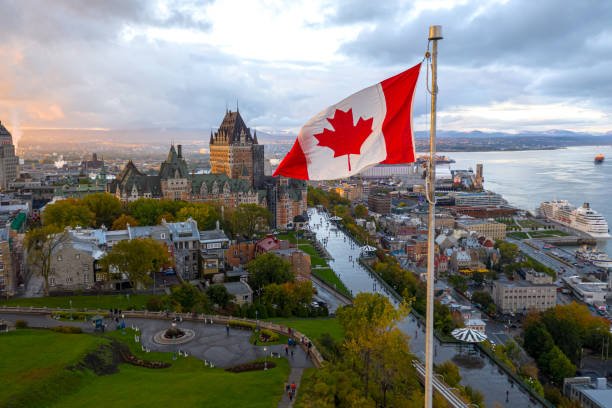Embarking on an international journey can be both exhilarating and nerve-wracking, especially when it involves securing a visa.
For those considering a visit to the beautiful land of maple syrup, pristine landscapes, and warm-hearted inhabitants, the Canada Embassy interview is a crucial step in the visa application process.
To help you prepare for this pivotal moment, we have compiled a comprehensive list of 28 frequently asked questions along with their well-crafted answers.
Table of contents
- FAQ #1: Why do I need an interview at the Canadian Embassy?
- FAQ #2: What documents should I bring to the interview?
- FAQ #3: What kind of questions should I expect during the interview?
- FAQ #4: How can I demonstrate strong ties to my home country?
- FAQ #5: What factors do immigration officers consider when evaluating my financial stability?
- FAQ #6: How long does a Canada Embassy interview usually last?
- FAQ #7: In which language will the Canada Embassy interview be conducted?
- FAQ #8: How can I prepare myself for the Canada Embassy interview?
- FAQ #9: Can I bring my family members to Canada with me?
- FAQ #10: How far in advance should I schedule my Canada Embassy interview?
- FAQ #11: Can I reschedule my Canada Embassy interview if necessary?
- FAQ #12: What should I wear to my Canada Embassy interview?
- FAQ #13: What should I do if I don’t understand a question during the Canada Embassy interview?
- FAQ #14: Is having travel insurance a requirement for obtaining a Canadian visa?
- FAQ #15: Can I appeal if my visa application is denied after the Canada Embassy interview?
- FAQ #16: How long does it typically take to receive a decision after the Canada Embassy interview?
- FAQ #17: Can I work in Canada with a tourist visa?
- FAQ #18: Can I apply for a Canadian visa directly at the Canadian Embassy in another country?
- FAQ #19: Can I apply for a Canadian visa online?
- FAQ #20: What are the common reasons for visa application denials?
- FAQ #21: Can I reapply for a Canadian visa after a previous denial?
- FAQ #22: Can I visit other countries while in Canada on a tourist visa?
- FAQ #23: Is it necessary to have a job offer in Canada to apply for a work visa?
- FAQ #24: Is it mandatory to submit biometrics as part of the visa application process?
- FAQ #25: Can I study in Canada on a tourist visa?
- FAQ #26: Can I extend my visa while I am in Canada?
- FAQ #27: Are there any age restrictions for obtaining a Canadian visa?
- FAQ #28: Can I apply for permanent residency in Canada after obtaining a temporary visa?
- Conclusion
- References
- Recommendations
FAQ #1: Why do I need an interview at the Canadian Embassy?
The Canada Embassy interview is an essential part of the visa application process to ensure the accuracy and legitimacy of your intentions to visit Canada.
This face-to-face conversation allows the immigration officer to evaluate your purpose of visit, financial stability, duration of stay, ties to your home country, and potential risks associated with your travel.
FAQ #2: What documents should I bring to the interview?
It is crucial to bring all the necessary documents to the Canada Embassy interview to demonstrate your eligibility for a visa.
Common documents include a valid passport, a visa application form, proof of financial support, a travel itinerary, ties to your home country (such as employment or property), and any supporting documents specific to your visit (such as an invitation letter for a conference or a letter of acceptance from a Canadian educational institution).
FAQ #3: What kind of questions should I expect during the interview?
The questions during the Canada Embassy interview can vary depending on your purpose of visit, individual circumstances, and the immigration officer’s discretion.
However, common questions revolve around your purpose of visit, duration of stay, ties to your home country, financial stability, previous travel history, and any potential risks involved.
Be prepared to answer truthfully, confidently, and concisely.
FAQ #4: How can I demonstrate strong ties to my home country?
Establishing strong ties to your home country is crucial to ensuring immigration officers that you have genuine reasons to return after you visit Canada.
Some ways to demonstrate strong ties include providing proof of employment, property ownership, family ties, or other irrefutable commitments.
Additionally, highlighting your plans and ambitions in your home country can further strengthen your case.
FAQ #5: What factors do immigration officers consider when evaluating my financial stability?
Immigration officers want to be assured that you have the necessary financial means to support yourself during your stay in Canada.
They will consider various factors, such as your employment status, income, savings, and any financial support from sponsors.
It is important to provide clear and verifiable evidence of your financial stability, such as bank statements, employment verification letters, and income tax returns.
FAQ #6: How long does a Canada Embassy interview usually last?
The duration of a Canada Embassy interview can vary depending on several factors, including the complexity of your case and the number of applicants being processed at the embassy.
On average, interviews typically last around 10-20 minutes.
However, it is advisable to arrive well in advance to allow sufficient time for any unforeseen delays or waiting periods.
FAQ #7: In which language will the Canada Embassy interview be conducted?
Canada is officially bilingual in English and French. However, in most cases, the interviews at the Canadian Embassy are conducted in English.
It is important to have a good command of the English language to effectively communicate your intentions and answer questions from the immigration officer.
If you are not comfortable with the English language, you might consider bringing a translator or seeking assistance from a certified interpreter.
FAQ #8: How can I prepare myself for the Canada Embassy interview?
To prepare for the Canada Embassy interview, start by thoroughly reviewing your visa application and supporting documents.
Familiarize yourself with the purpose of your visit, the duration of your stay, and potential questions that might be asked.
Practice answering these questions confidently and succinctly, emphasizing honesty and clarity.
Additionally, consider seeking guidance from an immigration lawyer or consultant, as they can provide valuable insights and personalized advice based on your circumstances.
FAQ #9: Can I bring my family members to Canada with me?
Yes, you can bring your family members with you to Canada, but it will depend on the type of visa you hold and the specific requirements for family sponsorship.
Canada offers different family sponsorship programs that allow Canadian citizens, permanent residents, and registered Indian status holders to bring their spouse or common-law partner, dependent children, or parents to Canada.
Each family sponsorship program has its criteria, so it is important to understand the specific requirements and process for sponsoring your family members.
FAQ #10: How far in advance should I schedule my Canada Embassy interview?
It is recommended to schedule your Canada Embassy interview as soon as possible after submitting your visa application.
The availability of interview slots may vary, but it is advisable to schedule it at least a few weeks in advance to ensure you have enough time to gather all the required documents and make any necessary preparations.
Check the official website of the Canadian Embassy in your country to find out the specific guidelines and procedures for scheduling your interview.
Read Also: 30 Frequently Asked HR Interview Questions and Answers
FAQ #11: Can I reschedule my Canada Embassy interview if necessary?
Yes, in most cases, you can reschedule your Canada Embassy interview if you are unable to attend the original appointment.
However, it is important to notify the embassy as early as possible and follow their instructions for rescheduling.
Keep in mind that the availability of new interview slots may be limited, so it is advisable to reschedule well in advance to avoid any delays in processing your visa application.
FAQ #12: What should I wear to my Canada Embassy interview?
It is recommended to dress in formal or business attire for your Canada Embassy interview.
Your appearance should convey professionalism and respect for the visa application process. Avoid wearing casual or overly flashy clothes, as they may not be perceived favorably.
Remember, creating a good impression by dressing appropriately can contribute to a positive overall evaluation during the interview.
FAQ #13: What should I do if I don’t understand a question during the Canada Embassy interview?
If you don’t understand a question during the Canada Embassy interview, don’t hesitate to politely ask the immigration officer to clarify or repeat the question.
It is important to ensure that you fully comprehend the question before providing an answer.
However, try to avoid asking for too many repetitions, as it may give the impression that you are not attentive or comprehending the conversation effectively.
FAQ #14: Is having travel insurance a requirement for obtaining a Canadian visa?
While travel insurance is not a specific requirement for obtaining a Canadian visa, having adequate health and travel insurance is highly recommended.
Travel insurance can provide coverage for medical emergencies, trip cancellations, and other unforeseen circumstances.
It demonstrates that you are prepared and responsible for any potential risks or expenses that may arise during your stay in Canada.
FAQ #15: Can I appeal if my visa application is denied after the Canada Embassy interview?
Yes, if your visa application is denied after the Canada Embassy interview, you may have the option to appeal the decision.
The appeals process may vary depending on the type of visa and the specific circumstances of your case.
It is crucial to carefully review the denial letter and follow the instructions provided, including the deadline and necessary documentation for appeal.
Consider seeking professional advice from an immigration lawyer or consultant to assess the viability of an appeal in your situation.
FAQ #16: How long does it typically take to receive a decision after the Canada Embassy interview?
The processing time for visa applications after the Canada Embassy interview can vary depending on various factors, such as the type of visa, the complexity of your case, and the workload at the embassy.
In general, it can take anywhere from a few weeks to several months to receive a decision.
You can check the official website of the Canadian Embassy or contact them directly to inquire about the estimated processing times for your particular visa category.
FAQ #17: Can I work in Canada with a tourist visa?
No, a tourist visa, also known as a visitor visa, does not permit you to work in Canada.
The purpose of a tourist visa is for temporary visits such as tourism, visiting family or friends, or attending short-term courses or conferences.
If you intend to work in Canada, you will need to apply for a work permit through the appropriate channels, based on the specific requirements and eligibility criteria for employment in Canada.
Read Also: 20 Frequently Asked Collection Officer Interview Questions And Answers
FAQ #18: Can I apply for a Canadian visa directly at the Canadian Embassy in another country?
In most cases, you must apply for a Canadian visa at the Canadian visa office responsible for your country or region of residence.
However, there are certain situations where you may be able to apply directly at the Canadian Embassy in another country. This process is known as “visa on arrival” or “visa application at the point of entry.”
It is advisable to check the official website of the Canadian Embassy or consult with an immigration professional to determine the most appropriate application process based on your circumstances.
FAQ #19: Can I apply for a Canadian visa online?
Yes, you can apply for a Canadian visa online through the official website of Immigration, Refugees, and Citizenship Canada (IRCC).
The online application process is known as the Electronic Travel Authorization (eTA) for visa-exempt countries or the online application for visitor visa (TRV) for non-visa-exempt countries.
The online application allows for a more convenient and streamlined process, where you can submit your application, pay the fees, and upload the required documents electronically.
FAQ #20: What are the common reasons for visa application denials?
Visa application denials can occur due to various reasons.
Some common reasons for visa application denials include incomplete or inaccurate documentation, insufficient proof of financial stability, failure to establish ties to the home country, doubts regarding the applicant’s intention to return home after the visit, criminal records, or misrepresentation of information.
It is essential to thoroughly review the visa requirements and submit a comprehensive and accurate application to minimize the chances of denial.
FAQ #21: Can I reapply for a Canadian visa after a previous denial?
Yes, you can reapply for a Canadian visa after a previous denial.
It is essential to address the reasons for the previous denial and make necessary improvements in your application.
Analyze the denial letter and incorporate any requested additional documentation or clarity to strengthen your case.
It may also be beneficial to seek professional guidance from an immigration lawyer or consultant to increase your chances of a successful reapplication.
FAQ #22: Can I visit other countries while in Canada on a tourist visa?
Yes, you can generally visit other countries while in Canada on a tourist visa, provided you have the appropriate travel documents and comply with the entry requirements of the countries you plan to visit.
However, be mindful of the duration of your stay in Canada specified by the visa and ensure that you adhere to the terms and conditions of your Canadian visa during your entire visit, including any restrictions on international travel.
Read Also: 20 Frequently Asked Call Center Agent Interview Questions
FAQ #23: Is it necessary to have a job offer in Canada to apply for a work visa?
Having a job offer from a Canadian employer is not always a requirement to apply for a work visa in Canada.
However, most work visa categories do require a job offer or sponsorship from a Canadian employer.
The specific requirements for each work visa category vary, and it is important to consult the IRCC website or seek professional advice to understand the eligibility criteria and application process for the specific work visa you are interested in.
FAQ #24: Is it mandatory to submit biometrics as part of the visa application process?
Yes, in many cases, it is mandatory to submit biometrics as part of the visa application process for Canada.
Biometrics typically include fingerprinting and a photograph. The purpose of biometrics is to enhance identity verification and facilitate more accurate immigration screening.
Check the IRCC website or contact the Canada Visa Application Center (CVAC) in your country to determine if biometrics are required for your visa application and to schedule an appointment for the collection of biometric information.
FAQ #25: Can I study in Canada on a tourist visa?
No, a tourist visa does not allow you to study in Canada. If you intend to study in Canada, you will need to apply for a study permit.
A study permit is a document issued by the Canadian government that allows foreign nationals to study at designated learning institutions in Canada.
The study permit is typically valid for the duration of the study program and may also provide certain work options, such as part-time work on campus.
FAQ #26: Can I extend my visa while I am in Canada?
Under certain circumstances, it may be possible to extend your visa while you are in Canada. You must apply for a visa extension before your current visa expires.
The eligibility for a visa extension depends on various factors, such as the type of visa, validity, and compliance with the conditions of your current visa.
It is recommended to consult the IRCC website or seek professional advice to understand the specific requirements and procedures for visa extensions in your case.
FAQ #27: Are there any age restrictions for obtaining a Canadian visa?
There are generally no specific age restrictions for obtaining a Canadian visa. However, some visa categories may have age-related criteria.
For example, the working holiday visa (International Experience Canada) has an upper age limit of 35 years for certain countries.
Additionally, minors (individuals under 18 years of age) may require additional documentation and consent from parents or guardians for visa applications.
It is advisable to review the specific requirements for your intended visa category to determine if any age-related restrictions apply.
FAQ #28: Can I apply for permanent residency in Canada after obtaining a temporary visa?
Yes, it is possible to apply for permanent residency in Canada after obtaining a temporary visa, depending on your circumstances and eligibility.
Several immigration programs, such as the Express Entry System, Provincial Nominee Programs (PNPs), and the Canadian Experience Class, provide pathways for individuals with temporary visas to transition to permanent residency.
Each program has its requirements and criteria, so it is advisable to research the programs and seek professional advice to determine the most suitable route for your situation.
Conclusion
Preparing for a Canada Embassy interview can undoubtedly be a daunting process, but with adequate practice and accurate information, you can confidently navigate through this crucial stage of the visa application process.
Remember, the key is to be honest, concise, and prepared to present the necessary documentation to support your case.
While we have highlighted 28 frequently asked questions, it is essential to equip yourself with knowledge and stay updated with the latest visa requirements and regulations.
Seek assistance from official Canadian government sources or consult an immigration lawyer or consultant for personalized advice regarding your specific situation.





